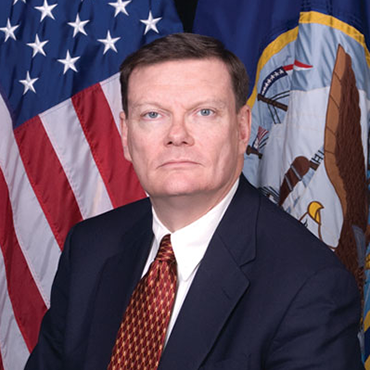Will hackers pay a price for targeting military networks?
A House panel wants to see adversaries face consequences for "eating our lunch" in cyberspace.

Defense Dept. CIO Terry Halvorsen
A trio of senior Pentagon officials told a House committee that they are trying to make it less enticing for hackers to go after U.S. military targets in cyberspace, through improved cyber hygiene and deterrence. But in the Sept. 30 hearing, members of the House Armed Services Committee were hoping for more solid fare.
"We’re looking for specifics" on what costs will be imposed on adversaries who are “eating our lunch” in cyberspace, Rep. Jim Langevin (D-R.I.) said at the hearing. The answers provided weren’t always specific, but they did reflect the administration’s emphasis on changing the economics of cyberspace.
Defense Department CIO Terry Halvorsen has singled out phishing attacks as a persistent problem for DOD network users. He told the HASC hearing that his office has "taken certain actions on the networks to eliminate the ability to click on links," and has increased training on phishing threats for personnel. The hack of the Joint Chiefs of Staff unclassified email network stemmed from a spear phishing attack, according to news reports.
U.S. Cyber Command Commander Adm. Michael Rogers chimed in to say that he, too, had been cracking down on sloppy behavior by network users via a series of technical changes to user rules.
"Quite frankly, I've told users that I’m going to make your life harder, if this is what it takes to drive a change in behavior," he said.
Deputy Defense Secretary Robert Work has said that imposing consequences to adversaries remains the weakest link in the Pentagon’s three-prong deterrence policy, which also includes denial of attacks and resilience of networks. While adversaries can conduct attacks on the cheap, the Pentagon spends around $44 billion annually on cybersecurity and IT, according to Halvorsen, who has called for private-sector help in imposing costs on adversaries.
The tight fiscal climate notwithstanding, the Pentagon looks set to continue to pour billions of dollars annually into cybersecurity programs. Defense officials addressed the responsibility that comes with this spending in the DOD cyber strategy released in April. "The financial choices that DOD makes in the course of implementing this strategy will have national and global implications for years to come," the strategy states, "and DOD must operate in an effective and cost-efficient manner to guarantee the best return on its investments."
In spending such vast amounts on defending its networks and building cyber capabilities, the Pentagon might be trying to make up for lost time and lost dollars.
"We are attempting to overcome literally decades of investment with a very different attitude," where redundancy, resiliency and defensibility were afterthoughts in the design of defense systems, Rogers told the committee.
NEXT STORY: How Many Websites Are There on the Internet?





